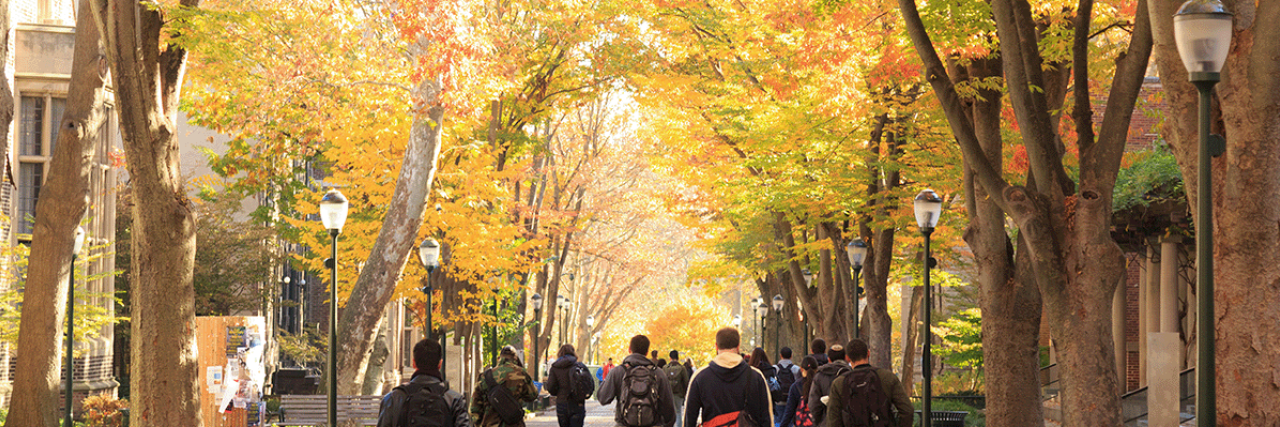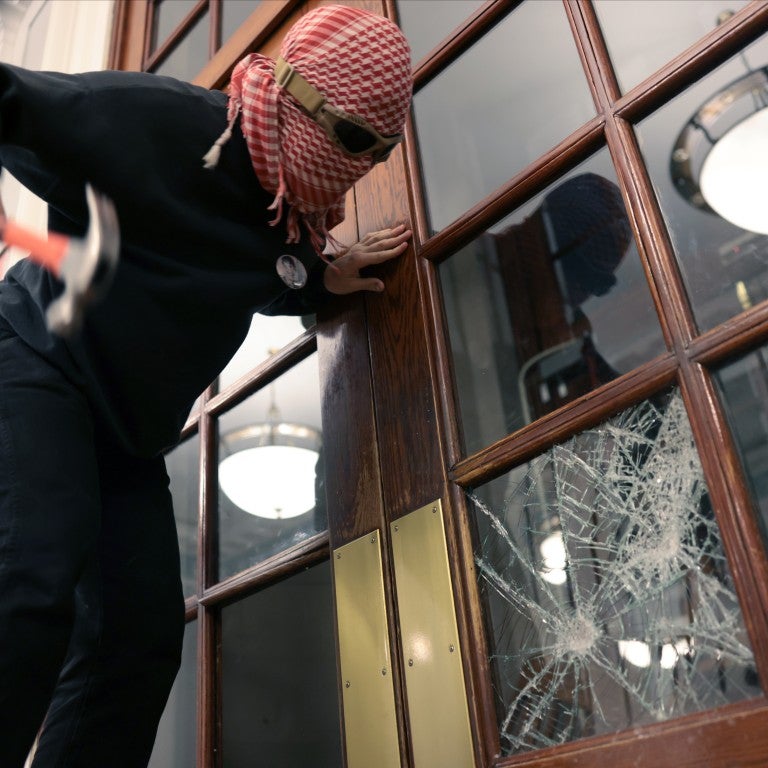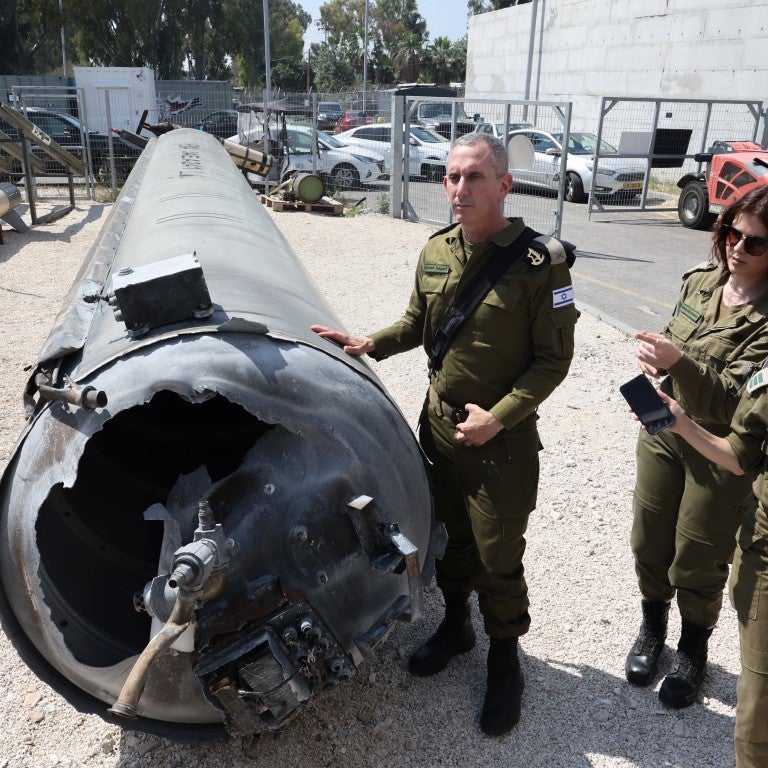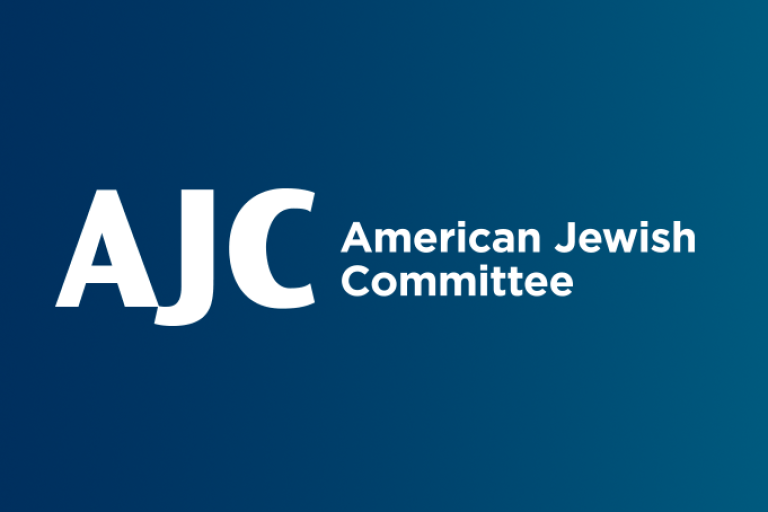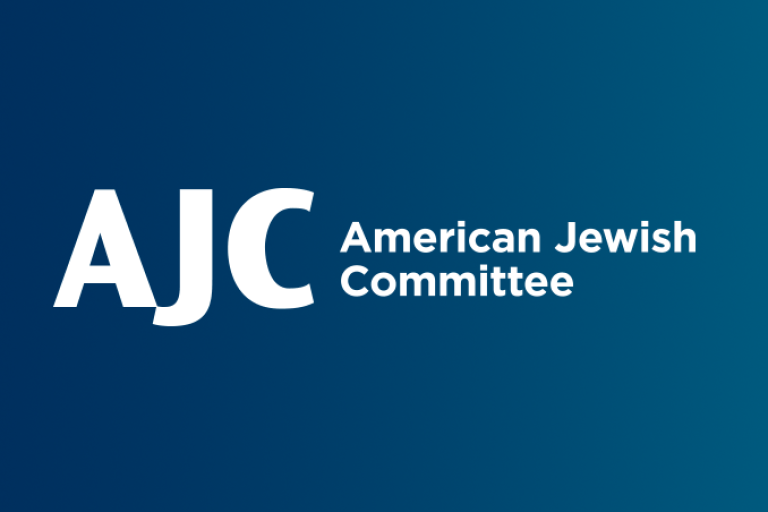November 16, 2023
Delve into the unsettling rise of antisemitism on American college campuses, focusing on alarming incidents at Cornell University and Columbia University. Our guests, Molly Goldstein and Elliot Sadoff, both members of AJC's Campus Global Board, share their experiences of Jewish students being targeted in the classroom, physically attacked while raising awareness about kidnapped babies in Gaza, and facing death threats for merely speaking Hebrew.
Join us as Molly and Elliott share their perspectives on this surge of antisemitism following the October 7th Hamas attacks, and the solidarity and Jewish pride they are seeing on campus.
*The views and opinions expressed by guests do not necessarily reflect the views or position of AJC.
Episode Lineup:
- (0:40) Molly Goldstein and Elliot Sadoff
Show Notes:
Listen – People of the Pod on the Israel-Hamas War:
- Jewish U.S. Military Veterans’ Message to IDF Soldiers Fighting Hamas: “We’re With You”
- What Would You Do If Your Son Was Kidnapped by Hamas?
- Renana Gomeh’s Sons Were Taken Hostage by Hamas: What She Needs You to Do to Bring Them Home Now
- What Biden’s Wartime Visit to Israel Signals to Hamas, Iran, Hezbollah
- Mai Gutman Was Supposed to Be at the Music Festival: IDF Lone Soldier Recounts Harrowing Week
- Responding to Hamas Terror: IsraAID CEO on How You Can Help Israelis Right Now
Learn:
- What is Known About Israeli Hostages Taken by Hamas
- 7 Ways Hamas Exploits Palestinian Civilians in Gaza
- How much do you know about Hamas? Try to ace our quiz and expose the truth about the terror group today.
- AJC Campus Library
- AJC Campus Global Board
Donate:
Follow People of the Pod on your favorite podcast app, and learn more at AJC.org/PeopleofthePod
You can reach us at: peopleofthepod@ajc.org
If you’ve appreciated this episode, please be sure to tell your friends, and rate and review us on Apple Podcasts.
Transcript of Interview with Molly Goldstein and Elliot Sadoff:
Manya Brachear Pashman:
Throughout her studies at Cornell University, junior Molly Goldstein has become passionate about the intersection of international relations, human rights and conflict resolution. She joined AJC's Campus global board last year to develop her Jewish advocacy skills on and off campus. But nothing could have prepared her for what has unfolded this year on Cornell's campus, where nearly a fourth of the students are Jewish. An arrest has been made after a number of posts on an online discussion board threatened extreme violence and death to Jews on campus, specifically identifying the address of Cornell's kosher dining hall.
Likewise, Elliot Sadoff also joined AJC's Campus global board last year. He is a dual degree student at Tel Aviv University and Columbia University, where an Israeli student was physically attacked while hanging posters of kidnapped babies trapped in Gaza. And Jewish students have received death threats and been spat upon for speaking Hebrew. Molly and Elliot are with us now to discuss what they've witnessed as antisemitism related to the Israel Hamas war has emerged at an alarming rate on a number of American college campuses across the country. Elliot, Molly, welcome to People of the Pod.
Molly Goldstein:
Thank you for having us.
Elliot Sadoff:
Yeah, thank you.
Manya Brachear Pashman:
So I first have to ask, how are you both doing? And how are you coping with the intensity of all of this?
Elliot Sadoff:
I mean, I think you can ask anyone how they're doing these days, and it's hard to answer. But definitely holding in there. I've been very lucky the past few weeks because of the program I'm in where I have a lot of students with me who are studying at Tel Aviv University. So we've really formed a tight knit community that's able to support each other throughout these times. With everything going on on campus and around the world. It's a very good support system to have that I don't think a lot of students do. It's not easy to go to class and be looking around you thinking what's going to happen, what are people going to say, what does this professor think? But to have a support system like that is very helpful.
Manya Brachear Pashman:
Molly, how about you?
Molly Goldstein:
Over the past month, it's definitely progressed to feeling more and more afraid to be a Jew on campus. But something that doesn't make it to the media, I believe the media likes to portray, you know, all the horrible things that are happening on campus, but the Jewish community at Cornell has really come together, in one of the most beautiful ways I have ever seen during my time at Cornell. We've had the Shabbat dinners with filling capacity of the kosher dining hall. We've had, you know, Jews from Monsey coming and bringing us food for a barbecue for 200 people. We had never met them before in our entire lives. And they just decided to come up and do this wonderful, wonderful, good deed for us. And there's nothing more I could have asked to be proud of as a Jew. And I hope that Jews on campus know that, although it's scary, we will get through this time. And we should be proud and continue to be Jewish.
Manya Brachear Pashman:
That's really comforting to hear. And I'm sure your parents find that really comforting to hear, especially as they watch the news and wonder how their children are doing. What are you hearing from them? How are they doing?
Molly Goldstein:
Yeah, parents are definitely more scared than I have ever seen them before. I mean, I had people's parents coming up to get their kids and take them home. People's parents like requesting that we have to sue the University and we have to get these kids off campus and we have to take really harsh actions. And it's because they're scared, they don't know what to do. They're far away from their kids. And, you know, it's up to us to make sure that their parents know that we'll be safe and, and for them to know that everything that needs to be done is getting done for Jewish students.
Manya Brachear Pashman:
Elliot, anything to add to that?
Elliot Sadoff:
Yeah, I mean, I can just echo what Molly was saying about kind of uniting around this and being proud of, like being Jewish and rallying around the community and that my parents are scared, a lot of parents are scared. But there's also been a lot of people working together to change that environment, to change the narrative to to help students be proud of who they are. I don't know if you've seen recently there's a large Facebook group, Mothers Against College Antisemitism, which I think now is hundreds of 1000s of people. I could be mistaken there. But it shows that there are people who care about us, there are people who care about protecting their identity and supporting students and I think that's really meaningful. That's very helpful to see on campus.
Manya Brachear Pashman:
Molly, can you walk our listeners through what has happened at Cornell? I mean, how did you first hear about the threats that I mentioned in the introduction? And what precautions did you and other students take?
Molly Goldstein:
Yeah, absolutely. So I was sitting in my room actually in the Center for Jewish Living, which was the place that was threatened by a bomb threat, as well as it's right next door to the kosher dining hall, which the student threatened to shoot up. And I was sitting, you know, doing homework in my room, and all of a sudden, there's a Cornellians for Israel group chat that now has 1000s of people in it. It's progressed over the month since the war has started. And we just get a link from one of the students that found it, and said, like, look, what we have posted online, and all of a sudden, all the threats started coming in. My immediate reaction was genuine fear. I'm sitting in the building, I did not know what was going to happen to me or my fellow community members. And pretty quickly, we got Cornell Police Department on the case, we got the FBI, Homeland Security, Ithaca police and New York State Police, everybody showed up and was at the dining hall and kosher spaces. And that night, the President of the University and vice president of the university came to our house, to see how we were doing and make sure that we know they're doing everything they can to ensure our safety.
And, you know, they would not have come if they really thought their lives were in danger. But it was scary. I had students, you know, weren't sleeping in the house that night. They found other places to go, whether that was other friends who had apartments or relatives, family, friends in Ithaca. And as the day went on, we had New York Governor Kathy Hochol came the next morning, the next morning, within just 12 hours was at our doorstep, talking to us, ensuring that New York State was going to do everything they can to condemn antisemitism to ensure our safety for not just Jewish students at Cornell, but Jewish students at all New York State campuses, which includes Columbia, and you know, CUNY schools, which are having a really difficult time with anti-Zionism and antisemitism. And as time went on, we were getting, you know, news media coverage. And we never went on lockdown. But we were doing everything we could to keep people safe.
Manya Brachear Pashman:
Did you feel that the university was doing enough to respond? It sounds like people from across the state were doing enough, or doing a lot. But was the university doing enough in your opinion?
Molly Goldstein:
In my opinion, yes. I think the fact that the President and the Vice President came immediately to make sure we're doing okay, they released a statement that night, and the next day they were updating their social media with everything that they were doing. And they just released actually that they are changing their antisemitism in their DEI training, so that it's more prevalent and that education can be better on that front.
Manya Brachear Pashman:
Eliott, can you walk our listeners through the atmosphere at Columbia, I know a student was attacked, but there have also been smaller acts of aggression. I won't say microaggressions because there's nothing micro about a swastika on a wall. But can you walk us through the general atmosphere there?
Elliot Sadoff:
Yeah, so I think throughout the past month, the atmosphere on campus at Columbia has generally felt unsafe for Jewish students. Obviously, there were the incidents where the physical safety of students was was under threat where the Israeli student was attacked for putting up posters of those that were kidnapped, but also reports of people yelling on campus, f the Jews or people being spit on and I think either one or two now swastikas being drawn on campus. But it just kind of fits into the broader rhetoric on campus. There seems to be the downplaying of antisemitism and anti Zionism and in class on campus, Jewish students aren't feeling safe. They aren't feeling welcomed by the professors, by their peers, by people in New York City. And the rhetoric for me from what I've seen and what my friends have seen from what I'm hearing from the pro Israel groups is that it seems the real effect and a real threat, antisemitism is being downplayed. There's an anonymous app that, obviously, it's an online platform. I think a lot of schools are dealing with this, where students sign up, can post whatever they want without consequences.
And for the past few weeks, it's been riddled with antisemitism. There seems to be no consequences for anyone. People are saying again, like F the Jews, Israel should be demolished. Lives of Israelis don't matter. And there's an antisemitic incident someone posted and all the comments are saying, This is not real. It's over blasted. This isn't a real threat to Jewish students. And that I think that doesn't that doesn't help anyone. It doesn't help the Palestinian cause to do this. It doesn't help the Israeli cause to do this. It's just it's making everyone feel unsafe.
Manya Brachear Pashman:
What is this app that you mentioned, where there is no accountability?
Elliot Sadoff:
So the apps called Sidechat, but I think other campuses have different ones-Sidechat, YikYak, some other ones where you have to log in with your student university email to verify that your student at Columbia, or then you get access to a Columbia on the message board where there's posting, you can upvote or downvote, you can comment, post images. And this entire month, the app just every day, you can't scroll through it. 75% of the posts are completely antisemitic, saying Jews don't have a right to live, Jewscan't do this, that, downplaying antisemitism, minimizing it saying it's not happening, saying Jewish lives don't matter. And these things have been brought up, from my understanding, this has been brought up to the university. And obviously, it's hard for them to control. We want everyone to be able to have free speech and speak their mind. But it seems that there's a line that's been crossed here, and Jewish students feel unsafe because of this, and it continues to this day, even this morning.
Manya Brachear Pashman:
And who runs this app? It's not a university run app. It's a company, right?
Elliot Sadoff:
It's a company, but they advertise at the club fair, they're on campus, they have tables, you need your university email to log in. So it seems there should be some way to provide accountability. And obviously, it's not an official university platform. But it's an atmosphere that's not safe for Jewish students. That's part of what's going on on campus.
Manya Brachear Pashman:
You said that there is a feeling of danger in the classroom that you have. Have you personally encountered hostility in the classroom?
Elliot Sadoff:
In a lot of my classes, it's that I don't want to spark hostility. And I don't want to say what my thoughts are, I don't want to say that I might feel unsafe as a Jewish student, I don't want to tell people that I went to school in Tel Aviv. And that's the program that I'm part of.
I mean, if I see some of my professors that I've had in the past signing a petition that says Hamas’ actions are legitimate military action, how am I supposed to feel safe on campus? My professors are signing this, ones that I've had, they know who I am, I've had conversations with them. And this is what they're signing. And that just adds into the fact that in some of my other classes, people are kind of using free speech as a guise to promote antisemitism and that one professor at Columbia described awe and joy at Hamas’ attack on Israel. And this is a pretty well known case that this professor has been espousing these ideas. And in my class, people are saying, this is free speech. You can't criticize him, you can't. You can't deny that you can't take action against him when there's a difference. It's clearly adding to a rhetorical atmosphere that's making Jewish students feel unsafe.
Manya Brachear Pashman:
And what about you, Molly? Has there been any hostility in classrooms at Cornell that you've, you've come across?
Molly Goldstein:
There are many students who have been coming out and reporting professors and other students in their classes, who are spewing anti-Israel, anti-Zionist views. And it's really toeing the line between anti-Zionism and real antisemitism. And it's scary. I mean, I know a student who has family who's in the IDF right now fighting in Gaza, and one of their cousin's just was killed and they tried to get accommodations from the professor and they weren't accommodating. There's another class on you know, colonialism and a writing seminar for first year students. So this is exactly what they're going to introduce to the university. And when they were first asked about their opinions on the Israeli Palestinian conflict, they said, you know, we feel bad for everybody, like innocent lives, nobody should be killed. This is not right. And the professor's reaction was to then say all the horrible things that Israel is doing, and tried to convince the class that they should be on the side of the Palestinians. And then they ask the question again, and almost nobody wants to talk because they were scared of disagreeing with the professor, or they were confused. And it's real propaganda that's being pushed through the university and people aren't able, people aren't able to make the distinctions and be able to freely express their opinions, their problems or opinions or their pro Jewish opinions for that matter.
Manya Brachear Pashman:
Has there been any kind of constructive dialogue either facilitated by faculty by students? Has there been any evidence that people are willing to understand other points of view or embrace the complexities of the conflict.
Molly Goldstein:
So the only experience I've had with true constructive dialogue was at the beginning, I'm like October 10, or 11th, or something like that. There was a student assembly meeting where SJP on campus, I proposed a resolution to condemn Cornell University for not speaking out for the Palestinian people. Their statement had only mentioned: Hamas is a terrorist organization and didn't say anything about the innocent Palestinian lives that are being lost. And in addition to that resolution, it was you should divest from Israel, you should deem it an occupied apartheid state. And a whole bunch of SJP people and a whole bunch of pro Israel, people came to the student assembly meeting.
And after everyone showed their views, the person who had originally proposed the resolution, wanted to amend it. And they said, You know what, I can understand why this was very harmful. Let's try to change and have constructive dialogue. And at the end, we all came together. And we were all talking about our views and our notions. And that was probably the last time that there was constructive dialogue on campus. Unfortunately, that was like three weeks ago. Since then, you know, the university has had panels and other talks led by professors, but the academics are not in favor of Israel. They do not like to show both sides of the narrative. And it's always from an anti-Israel voice. And it's scary and hard to see.
Manya Brachear Pashman:
Elliot, how about constructive dialogue on Columbia's campus–any at all?
Elliot Sadoff:
I know that the School of International and Public Affairs has held a few meetings, but it hasn't been student dialogue at all. It's just been webinars from what I understand. And since a month ago, October 7, I haven't seen anything with students that's been constructive, that's been meaningful. And I think that's really the issue that I see with that, and I think a lot of other Jewish students do with that is that it doesn't help us it doesn't help anyone that there's no constructive dialogue. If someone wants to sit down with me and discuss the Israeli Palestinian conflict, I'm happy to do so. I know that there's a lot to discuss. But I haven't seen any of that. All I've seen as Israel's bad. Israel's done this. No actual discussion, and how does that help anyone? I can't sit here and, and feel safe and feel safe to discuss this. If people won't condemn Hamas. People will say: the resistance lives, I support them, they're not a terrorist organization, they didn't behead babies. Then there's no room for discussion.
Manya Brachear Pashman:
You know, I keep using the word constructive. But I guess really, another word is compassionate. I mean, has there been compassionate dialogue? And I think one, they are one in the same in this situation. Would you characterize any of the conversations you've had with individual students as leaning toward compassionate, even if not really all that constructive?
Elliot Sadoff:
Personally, I've not. And I think that's what's so hurtful is that I would love to have a compassionate conversation. Recognize that right now, both Israelis and Palestinians are suffering. It's the sad truth. It's the reality. But if you can't acknowledge that, if you can't recognize that Israelis are suffering, too. There's no room for compassion.
Manya Brachear Pashman:
So AJC has developed an action plan for confronting campus antisemitism. It's a toolkit for students. It closely follows the US national strategy to counter antisemitism that was unveiled by the White House in May. The final step in that toolkit is recruiting and forming a task force to address antisemitism on campuses. Do you see that happening at Cornell or Columbia?
Elliot Sadoff:
Fortunately, Columbia, about a week and a half ago, announced that they're launching an Antisemitism Taskforce, which is welcomed, I'm very happy that you're doing it. It's something that is necessary to protect Jewish students and to protect everyone on campus. Personally, though, it is a little upsetting that it took this to happen for there to be an Antisemitism Task Force as antisemitism is not a new problem. This anti-Israel, anti-Jewish sentiment is not a new problem on campus or in the world. And the fact that it's being launched, investigated and addressed as a result of a lot of bad stuff happening as opposed to proactively protecting students on campus is a little upsetting. Obviously, it's a welcome step, it's a step in the right direction. But I don't know if I feel any safer now than I did last week before it was announced.
Manya Brachear Pashman:
College is hard enough. And so I'm really impressed that both of you joined us, that both of you are confronting this problem and this challenge and doing so with such bravery and such poise. Thank you so much for sharing your experiences with us and we're gonna be rooting for you and fighting for you every step of the way.
Molly Goldstein:
Thank you so much.
Elliot Sadoff:
Thank you for having us.
